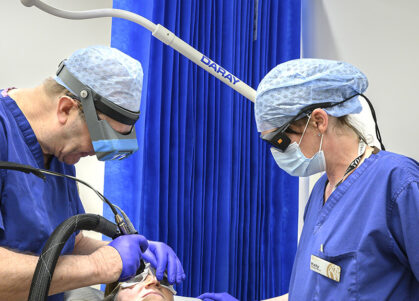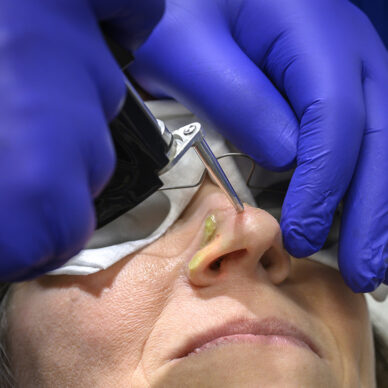Types Of Skin Lesions
Facial skin lesions come in many forms, some are harmless, while others may need medical attention. Understanding the different types can help you know when to seek advice.
- Moles: These are common and usually harmless, but any changes in size, shape, or colour should be checked by a specialist.
- Cysts: Small, fluid-filled lumps under the skin that are often harmless but can become inflamed or infected.
- Skin Tags: Soft, small growths often found around the eyes or neck. They’re harmless and can be easily removed if they become bothersome.
- Warts: Caused by a virus, warts can appear on the face and may spread or become irritated.
- Actinic Keratoses: Dry, scaly patches caused by sun damage. These can be a warning sign of skin cancer and should be assessed.
- Basal Cell Carcinoma (BCC): A slow-growing skin cancer, often appearing as a shiny bump or scab that doesn’t heal.
- Squamous Cell Carcinoma (SCC): A more aggressive form of skin cancer that may look like a sore, crusty patch, or thickened skin.
- Melanoma: The most serious form of skin cancer. It often starts as a new mole or a change in an existing one and can spread if not treated early.
If you notice a new or changing lesion on your face, it’s always best to have it reviewed by a specialist. Early diagnosis makes treatment simpler and more effective.
Personalised Care
Your consultant will carefully assess any skin lesions, often using magnification for a more detailed view. Depending on the case, further tests may be recommended, such as blood tests, allergy testing, or microbial analysis of skin swabs.
If there is any concern that a lesion may pose a medical risk, it will be thoroughly investigated. Even when seemingly harmless lesions are removed, they are often sent to a laboratory for analysis to confirm there is no underlying issue.
Achieving a good cosmetic outcome is important, but your long-term health remains the top priority throughout your care.
Your consultant will explain their diagnosis clearly, outline the treatment options available, discuss timescales, and talk through the expected results with you.
Treatment Types
Non-Surgical Treatment Options
Some skin lesions can be successfully treated without surgery. Depending on the type and severity, treatments may include medicated creams, cryotherapy (freezing), curettage (scraping), or light-based therapies. These approaches are often suitable for superficial or less aggressive lesions.
When Surgery Is the Best Option
In many cases, surgical removal remains the most effective and reliable option. It not only helps prevent the lesion from returning or spreading but also allows for laboratory analysis to confirm there are no underlying risks. Surgery can also provide the best cosmetic results, especially for facial lesions.
The Surgical Procedure
Lesion removal can be carried out under local or general anaesthetic, depending on the location, size of the lesion, and your personal preference. The area will be cleaned with an antiseptic solution, and the section to be removed may be marked beforehand. Most procedures are quick and performed as a day case.
Wound Closure and Skin Grafts
Once the lesion is removed, the wound may be closed with a simple dressing or with stitches. Your surgeon will carefully consider the natural lines of your face to support optimal healing and minimal scarring. If a skin graft is needed, it is usually done during the same procedure. Skin may be taken from discreet areas such as behind the ear or near the collarbone and then sutured into place.
Ongoing Support
After your procedure, we’ll provide clear guidance on how to care for the treated area at home. This includes keeping the wound clean, managing any discomfort, and knowing what to expect as it heals. If stitches are used, we’ll arrange a follow-up appointment for their removal and to check on your progress.
Your consultant will advise on regular skin checks to monitor for any new or recurring lesions. We’ll also help you understand how to protect your skin in the future, including sun safety and when to seek advice for any changes.
Treatment at our London clinic is always based on individual care. If we can help in any way, please get in touch.

